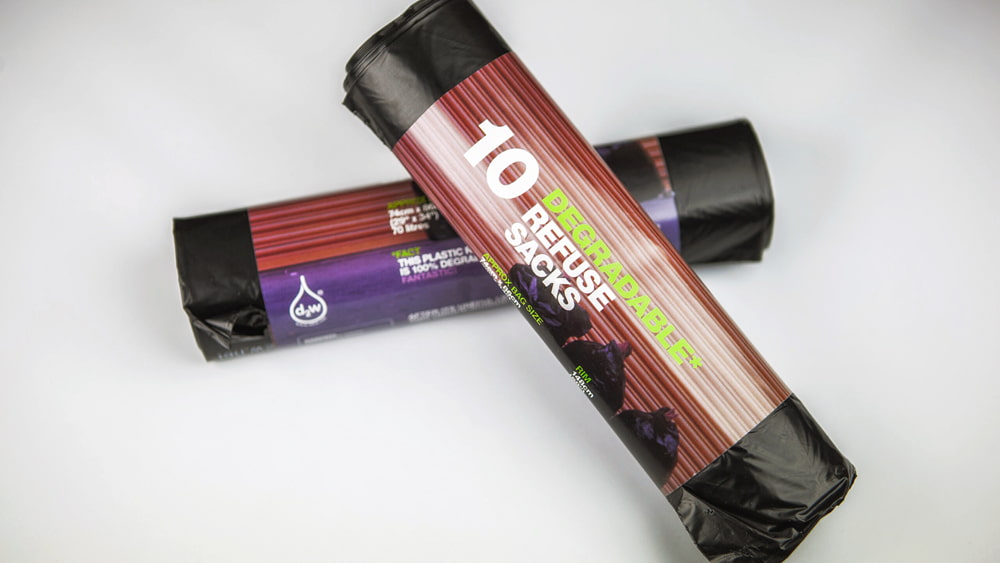Tie handle, draw tape, and multi-purpose refuse sacks and waste bags. Made with d2w biodegradable technology.

d2w biodegradable refuse sacks
Our d2w refuse sacks should be disposed of in the same way as ordinary plastic refuse sacks. They are recyclable, but are more likely to end up in landfill, where degradation is not necessary. d2w refuse sacks are not designed to degrade in anaerobic conditions deep in landfill, because anything which then biodegrades in those conditions creates methane – a dangerous greenhouse gas.
The difference with ordinary refuse sacks is that d2w sacks will biodegrade harmlessly into CO2, water, and biomass if they accidentally get into the open environment on land or sea. Unfortunately a lot of plastic does get into the open environment, where it creates microplastics and can lie or float around for decades. This has caused much public concern about plastic, and is the reason why d2w was invented. Businesses should be using d2w technology to help achieve their Corporate Social Responsibility goals.
The timescale for biodegradation in the open environment is 12–18 months in optimal conditions, and will always be much quicker than ordinary plastic. It will be accelerated by heat and light, but once initiated it will continue (more slowly) even in cold dark conditions.
The sacks are tested for degradation and biodegradation by the methods prescribed by the ASTM D6954 Standard.
How do d2w biodegradable refuse sacks work?
The refuse sacks are made with our biodegradable plastic technology.
This technology is added as a masterbatch to ordinary plastic bags at the factory where they are made, and it transforms the plastic at the end of its useful life, in the presence of oxygen, into a material with a different molecular structure. It is then no longer plastic and is biodegraded by bacteria and fungi in the open environment.
Do d2w refuse sacks contribute to pollution via microplastics?
Microplastics come from the fragmentation of ordinary plastic, caused by UV light and mechanical stress. The problem is that although these fragments are small, their molecular-weight remains too high for biodegradation. As a result they accumulate in the environment, getting smaller and smaller over a period of many decades.
Yet, if plastic products are made with d2w technology, the molecular-weight of the plastic will reduce much more quickly. It transforms into a waxy substance that is no longer a plastic, and is a source of nutrition for naturally-occurring micro-organisms such as bacteria and fungi.
Professor Ignacy Jakubowicz, one of the world’s leading polymer scientists, has described the process as follows:
“The degradation process is not only a fragmentation, but is an entire change of the material. The material changes from a high molecular weight polymer, to monomeric and oligomeric fragments, and from hydrocarbon molecules to oxygen-containing molecules which can be bioassimilated.”
The four-year “Oxomar” study sponsored by the French government found that d2w plastics “biodegrade in seawater and do so with significantly higher efficiency than conventional plastics,” and that “The oxidation level obtained due to the d2w prodegradant catalyst was found to be of crucial importance in the degradation process.”
Do these bags contain “heavy metals”?
No. Our d2w masterbatch contains metal salts, which are trace elements required in the human diet, but they should not be confused with toxic heavy metals such as lead, mercury, cadmium, and chromium.
Do the bags leave any harmful residues?
No. d2w biodegradable plastic passes the eco-toxicity tests according to OECD standards. These include seed germination, plant growth, and organism survival (daphnia, earthworms etc).
Can the d2w biodegradable refuse sacks be composted?
The bags can be used to send food or garden waste for composting, but many industrial composters do not want plastic of any kind in their facilities, so they empty the bags before the waste is processed. If by chance the bags get into the composting process they will biodegrade, but not necessarily in the short timescale required by EN13432. Tests by Eurofins Laboratories have shown 88.9% biodegradation and tests by Intertek showed 92.74% biodegradation.
Even better
d2w refuse sacks can also be made with Symphony’s d2p anti-microbial technology.
Disclaimer: Symphony’s products are supplied to businesses, not to consumers. Symphony does not give legal advice, and it is therefore the buyer’s sole responsibility to identify and comply with all legislation which applies to the sale and use of Symphony’s products, and goods made with those products, in the place where they are placed on the market, sold and/or used. It is also therefore the buyer’s sole responsibility to identify and comply with all applicable legislation and codes of practice when making any statement on or in respect of such products and/or goods